
Financial Internet Quarterly
Scope & Guideline
Advancing Knowledge at the Intersection of Finance and Technology
Introduction
Aims and Scopes
- Digital Finance and Technology Integration:
This area explores the intersection of finance and technology, including the impacts of digital currencies, mobile banking, and online financial services on traditional banking systems. - Economic Impacts of Financial Policies:
Research in this scope examines how various financial policies and regulations affect economic growth, stability, and individual firm performance, providing insights into fiscal and monetary strategies. - Financial Inclusion and Accessibility:
This focus addresses the barriers to financial services for underserved populations, analyzing determinants of financial inclusion and the effects of initiatives aimed at increasing access to financial resources. - Corporate Governance and Risk Management:
Studies in this category investigate the role of corporate governance structures in mitigating risks, enhancing transparency, and improving overall financial performance of organizations. - Sustainability and Green Finance:
This scope emphasizes the importance of environmental, social, and governance (ESG) criteria in financial decision-making, exploring how sustainable practices can be integrated into financial strategies. - Behavioral Finance and Investor Psychology:
Research in this area delves into the psychological factors that influence investor behavior and decision-making processes, contributing to a deeper understanding of market dynamics.
Trending and Emerging
- Cryptocurrency and Blockchain Technologies:
Research on cryptocurrencies and blockchain technology is increasingly prevalent, examining their implications for financial systems, security, and regulatory frameworks. - Impact of COVID-19 on Financial Practices:
The pandemic has prompted a surge in studies exploring its effects on corporate finance, liquidity management, and changes in consumer behavior, highlighting the need for adaptive financial strategies. - Environmental, Social, and Governance (ESG) Factors:
There is a growing focus on ESG factors, reflecting a shift towards sustainable finance and the integration of ethical considerations into investment decisions. - Behavioral Insights in Financial Decision-Making:
Emerging research emphasizes the role of behavioral finance, investigating how psychological factors and biases influence investor actions and market outcomes. - Innovations in Risk Management:
Recent publications have increasingly addressed advanced risk management techniques, including the use of AI and machine learning to assess and mitigate financial risks.
Declining or Waning
- Traditional Banking Practices:
Research focusing solely on conventional banking practices has decreased as digital transformation and fintech solutions gain traction, indicating a shift towards more innovative approaches to finance. - Static Economic Models:
There is a waning interest in static economic models that do not incorporate dynamic variables or technological advancements, as researchers increasingly favor more adaptable and real-time analytical frameworks. - Local vs. Global Capital Flows:
Studies that exclusively compare local and global capital flows have become less frequent, as researchers are now more interested in the implications of global economic integration and the influence of digital currencies.
Similar Journals
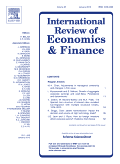
International Review of Economics & Finance
Exploring New Horizons in Economics and Finance.International Review of Economics & Finance is a premier academic journal published by ELSEVIER, dedicated to advancing the fields of economics and finance through high-quality, peer-reviewed research. With a distinguished history dating back to 1992 and set to continue until 2024, this journal holds an impressive Q1 ranking in both Economics and Econometrics and Finance categories as of 2023, showcasing its influential role in shaping scholarly discussions. The journal’s focus on empirical and theoretical advancements makes it an essential resource for researchers, professionals, and students seeking to understand and engage with cutting-edge economic and financial theories. Indexed in Scopus, the journal ranks in the top tiers for both finance and economics, underscoring its global impact within these disciplines. Although it does not offer open access, the journal remains committed to disseminating vital insights and fostering ongoing dialogue in the academic community.
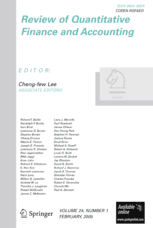
Review of Quantitative Finance and Accounting
Transforming Data into Knowledge in Finance and AccountingThe Review of Quantitative Finance and Accounting, published by Springer, is a distinguished academic journal that has been at the forefront of scholarly discourse since its inception in 1991. With an ISSN of 0924-865X and an E-ISSN of 1573-7179, this journal specializes in the interdisciplinary realms of accounting and finance, particularly emphasizing quantitative methodologies and their applications in real-world scenarios. With an impressive track record reflected in its 2023 rankings, it sits in the Q2 category across key fields such as Accounting, Business Management, and Finance, demonstrating its relevance and influence within these domains. Although it operates without an Open Access option, the journal's content remains vital for researchers, professionals, and students aiming to deepen their understanding of quantitative approaches in finance and accounting contexts. The Review of Quantitative Finance and Accounting stands as an essential resource for advancing knowledge and fostering innovation within these critical disciplines.
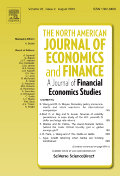
North American Journal of Economics and Finance
Fostering rigorous exploration in finance and economics.The North American Journal of Economics and Finance is a premier academic journal published by Elsevier Science Inc. since 1992, dedicated to advancing the field of economics and finance through rigorous research and scholarship. With an impressive impact factor and recognition in the Q2 category for Economics and Econometrics and Q1 for Finance as of 2023, this journal holds a significant position in the academic community, ranked #41 out of 317 in Finance and #100 out of 716 in Economics. The journal features high-quality, peer-reviewed articles that cover a broad range of topics, from theoretical frameworks to empirical analyses and practical applications. Though not an open-access platform, the journal provides valuable insights for researchers, practitioners, and students alike, promoting knowledge dissemination in the dynamic landscape of economic and financial studies. With its commitment to excellence, the North American Journal of Economics and Finance serves as an essential resource for those seeking to deepen their understanding of contemporary issues in these critical fields.
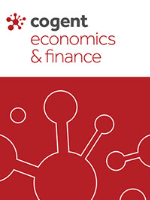
Cogent Economics & Finance
Empowering scholars with open access to innovative finance studies.Cogent Economics & Finance is a prominent open-access journal published by Taylor & Francis AS, catering to the dynamic fields of economics, econometrics, and finance. With an ISSN of 2332-2039, this journal aims to foster interdisciplinary dialogue and disseminate cutting-edge research from 2013 onwards. Hailing from the United Kingdom and featuring open access since its inception, it provides a platform for researchers, practitioners, and students to access high-quality scholarly articles without barriers. Currently categorized in the Q3 quartile for both Economics & Econometrics and Finance as of 2023, Cogent Economics & Finance remains vital for advancing knowledge in these areas, evidenced by its respectable Scopus rankings—310 out of 716 in Economics and Econometrics and 143 out of 317 in Finance. Its scope encompasses innovative research methodologies and policy implications, making it a significant resource for those on the cutting edge of economic and financial studies. Join us in exploring the critical aspects of this evolving field through our richly detailed articles, which support the academic community in addressing contemporary challenges and opportunities.
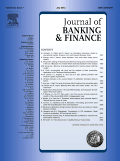
JOURNAL OF BANKING & FINANCE
Navigating the Complexities of Finance with ExpertiseWelcome to the Journal of Banking & Finance, a premier publication in the fields of finance and economics, expertly published by Elsevier. With its esteemed Q1 ranking in both the Economics and Econometrics and Finance categories for 2023, this journal frequently garners significant attention from researchers, professionals, and academics alike. Established in 1977, it has become a crucial resource for the latest research and advancements in banking and financial services, influencing policies and practices on a global scale. The journal's commitment to high-quality, peer-reviewed content ensures that it not only contributes to academic discourse but also drives real-world financial innovation. As part of the respected Elsevier publishing collection, the journal's rigorous standards and comprehensive analysis serve as indispensable tools for those seeking to understand and navigate the complexities of the financial landscape. Located in the Netherlands, the Journal of Banking & Finance continues to play a vital role in shaping the future of financial research through its impactful insights and research contributions.
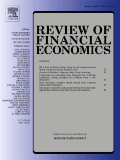
Review of Financial Economics
Illuminating the Intersection of Economics and FinanceReview of Financial Economics, published by WILEY, stands as a prominent peer-reviewed journal in the fields of economics and finance. Established in 1994, this journal provides a platform for rigorous research and thoughtful discourse, contributing to the advancement of knowledge in financial theory and its applications. With an HIndex indicative of its citation impact, it ranks in the Q3 quartile for both Economics and Econometrics, as well as Finance, based on the 2023 categorization, underscoring its role in the academic community. Although it does not currently offer Open Access, the journal remains accessible to a wide audience through institutional subscriptions. Researchers, professionals, and students are encouraged to engage with its insightful articles that address contemporary issues and advancements within financial economics, fostering a deeper understanding of the complex interplay between economic systems and financial markets.

Financial and Credit Activity-Problems of Theory and Practice
Fostering Dialogue in the World of Finance and CreditFinancial and Credit Activity-Problems of Theory and Practice is an esteemed academic journal published by FINTECHALIANCE, specializing in the multifaceted realms of accounting, business, economics, and finance. Since its inception in 2017, this Open Access journal has committed to disseminating vital research that addresses both theoretical frameworks and practical issues within these fields, making it an invaluable resource for researchers, professionals, and students alike. With its ISSN 2306-4994 and E-ISSN 2310-8770, the journal aims to foster a robust dialogue among stakeholders, contributing to the advancement of knowledge and innovative practices in financial and credit activities. Notably positioned in the Q4 Quartile across several categories, including Accounting and Finance, the journal continues to strive for improvement, fostering future growth within the academic community. Situated in Kyiv, Ukraine, this journal stands as a beacon for advancing scholarly discourse and enhancing practical understanding in its targeted fields.
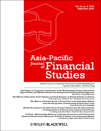
Asia-Pacific Journal of Financial Studies
Advancing Financial Knowledge Across the Asia-PacificAsia-Pacific Journal of Financial Studies is a premier academic journal published by WILEY, dedicated to advancing the field of finance within the dynamic Asia-Pacific region. With an ISSN of 2041-9945 and an E-ISSN of 2041-6156, this journal stands out for its rigorous peer-reviewed research spanning various topics in finance, making it a vital resource for researchers, practitioners, and students alike. It has achieved an impressive Q2 ranking in Finance as of 2023, placing it within the top half of finance journals as measured by its relevance and quality of contributions in the Scopus Economics, Econometrics and Finance category. Additionally, the journal supports researchers with robust access options, promoting broader dissemination of knowledge. Its dedicated focus from 2006 to 2024 highlights the journal's commitment to continuous scholarly exchange and innovation in financial studies. As it thrives in the competitive landscape of scholarly publishing, the Asia-Pacific Journal of Financial Studies not only enriches academic discourse but also informs practices that shape financial markets and policies in the region.
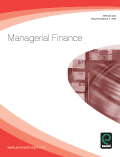
MANAGERIAL FINANCE
Shaping the Future of Managerial Finance.MANAGERIAL FINANCE is a prestigious academic journal published by Emerald Group Publishing Ltd, focused on the areas of finance, management, and strategy. With an ISSN of 0307-4358 and an E-ISSN of 1758-7743, this journal has carved a niche for itself within the business and financial sectors, achieving a commendable Q2 category ranking across multiple domains, including Business, Management and Accounting, Finance, and Strategy and Management, as of 2023. The journal aims to provide a platform for insightful research and critical analysis while fostering an understanding of contemporary financial practices and theories. With its wide-ranging scope, it serves as a vital resource for researchers, professionals, and students alike, looking to stay abreast of the latest trends and challenges in managerial finance. The editorial board is committed to maintaining academic rigor, ensuring that articles published are of the highest quality and relevance to the field. By bridging the gap between theory and practice, MANAGERIAL FINANCE is an essential reference for anyone involved in financial decision-making and strategic management.
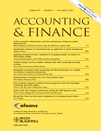
Accounting and Finance
Fostering excellence in financial research and application.Accounting and Finance is a premier journal published by WILEY that serves as a significant platform for interdisciplinary research in the dynamic fields of accounting, finance, and economics. With a commitment to advancing knowledge and practice, this journal has maintained a strong presence since its inception in 1979 and continues to attract high-quality contributions that address contemporary challenges and trends. It holds an impressive impact factor, reflecting its rigorous peer-review process and the high citation rates of its publications. Categorized in the second and first quartiles across multiple fields, including accounting and economic finance, it ranks highly among its peers, notably achieving a rank of #39 out of 176 in Accounting and #40 out of 242 in Economics, Econometrics, and Finance (miscellaneous). While it does not offer Open Access options, the journal remains accessible through academic institutions and libraries, promoting the dissemination of knowledge to researchers, industry professionals, and students alike. Recognized for its scholarly contributions and practical implications, Accounting and Finance continues to shape the discourse in its respective fields, making it an essential resource for anyone seeking to deepen their understanding of financial systems and regulatory frameworks.